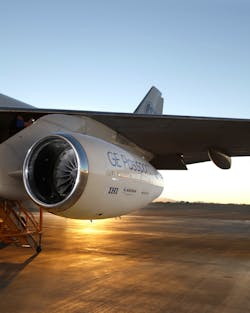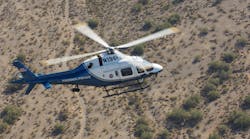GENEVA, Switzerland – May 23, 2016 – GE Aviation’s PassportTM engine for business jet applications was awarded type certification by the U.S. Federal Aviation Administration (FAA), paving the way for its 2018 entry into service powering Bombardier’s* Global* 7000* business jet. The Passport is the most advanced engine in its class, designed to power a new generation of extra-long-range business aircraft between 10,000 to 20,000 lbs of thrust.
To watch a YouTube video overviewing Passport’s certification journey, click here: https://www.youtube.com/watch?v=PlrjtdJE5UQ
“Achieving FAA certification is a fantastic accomplishment for the Passport program and the dedicated team who worked tirelessly to ensure we met or exceeded all performance objectives in support of this industry-leading aircraft,” said Brad Mottier, vice president and general manager of GE Aviation’s Business & General Aviation and Integrated Services division. “Unique technologies like the fan blisk, integrated propulsion system from Nexcelle and super finish in the compressor helped enable the demonstrated performance, giving us great confidence to support Bombardier’s flight test program while we aggressively pursue new aircraft applications for the Passport.”
“The Global 7000 and Global 8000 aircraft are segment-defining jets designed with an uncompromising and innovative approach to comfort and performance,” said David Coleal, President, Bombardier Business Aircraft. “GE has designed and certified an engine that matches this innovative philosophy. We congratulate their team on this critical milestone.”
As of May 23, the Passport has accumulated more than 2,400 hours and 2,800 cycles in ground and flight testing. By the time the Passport enters into service, it will have accumulated the equivalent of 10 years of flying for a Global 7000 or Global 8000* aircraft operator with more than 4000 hours and 8000 cycles.
In 2015, GE successfully completed Passport fan blade out testing at its Peebles Test Operation, a rigorous series of block endurance tests including a triple redline test for hot section durability validation. Prior to these tests, the Passport completed many certification milestones, including: flight trials aboard GE’s 747-100 Flying Test Bed, ice ingestion, hailstorm ingestion, water ingestion, altitude and crosswind testing.
Sporting an industry-leading 23:1 compressor pressure ratio, the Passport engine, powering Bombardier’sGlobal 7000 and Global 8000 business jets, incorporates advanced technologies and materials to provide 8% lower specific fuel consumption than competing engines in its class. It also generates significantly lower emissions and reduced noise, surpassing the Committee on Aviation Environmental Protection (CAEP) Tier 8 emissions standards and meeting the Federal Aviation Administration’s Stage 4 noise regulations.
The Passport engine benefits from the breadth of GE’s large commercial engine experience. It includes a high performance core similar to the best-selling LEAP engine (developed by CFM International, the 50/50 joint company between GE and Safran Aircraft Engines) derived from the eCore program, materials and design conditions similar to the GE90 and GEnx engines, low emission technology from the GP7000 and advanced technology such as the blisk and composites from military engines.
Among the engine technologies: a composite fan case to reduce weight, a unique 52-inch front fan blisk for lower cabin noise and vibration and technologies from GE's eCore suite to lower emissions and improve fuel efficiency. The Passport's integrated propulsion system from Nexcelle, a joint venture between GE and Safran, will feature a slim-line nacelle with clam-shell cowl opening to reduce weight and drag while allowing for easy maintenance access and high dispatch availability.
Passport's high pressure compressor (HPC) blades and blisks feature a unique super finish surface, which enables the blades to be four times smoother than traditional blades. The super finish allows air to pass more efficiently over the blades, resulting in lower fuel consumption. The surface finish also allows the blades to better retain their efficiency and performance by creating a layer of air, which guards against contaminants that might stick to traditional blades.
Passport production engines will be manufactured and maintained at GE Aviation’s facility in Strother, Kansas.GE Aviation began operating at the Strother facility in 1951. Currently, the site services the following jet engines: the CFM56 for single-aisle aircraft, the CF34 for regional aircraft, and the T700 and CT7 for various helicopters and fixed-wing aircraft.
In 2013, GE announced agreements with IHI of Japan and Techspace Aero (Safran) of Belgium to become joint venture partners on GE's Passport. IHI and Techspace Aero are responsible for more than 37% of the Passport engine. Headquartered in Tokyo, Japan, IHI is responsible for the low-pressure turbine module, aerodrive systems, fan hub frame and aft fan case (~30% of the Passport program). Techspace Aero, located in Liège, Belgium, is responsible for the booster module, lube tank and pump and the heat exchangers (~7% of the Passport program).
GE Aviation, an operating unit of GE (NYSE: GE), is a world-leading provider of jet, turboprop and turboshaft engines, components and integrated systems for commercial, military, business and general aviation aircraft. GE Aviation has a global service network to support these offerings. For more information, visit us at www.ge.com/aviation. Follow GE Aviation on Twitter at http://twitter.com/GEAviation and YouTube at http://www.youtube.com/user/GEAviation.
TMPassport is a trademark of General Electric Company.
*Trademarks of Bombardier Inc. or its subsidiaries.


